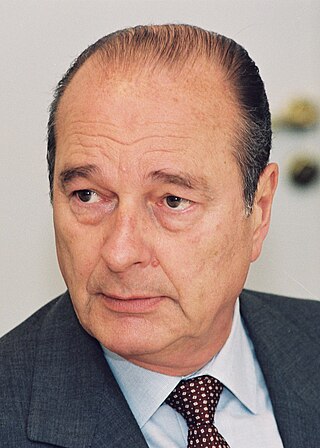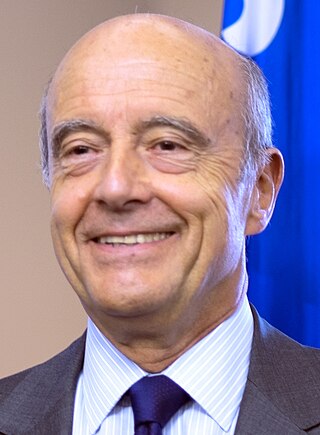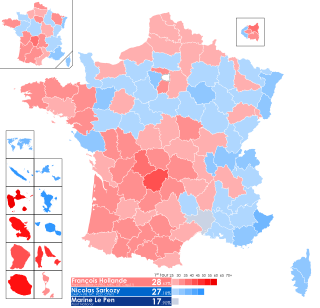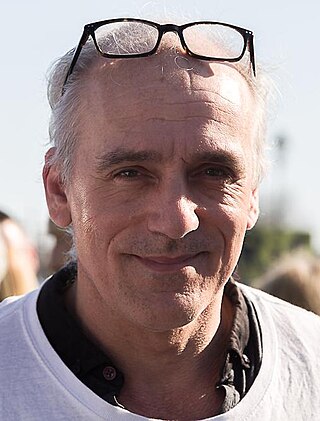Related Research Articles

Jacques René Chirac was a French politician who served as President of France from 1995 to 2007. He was previously Prime Minister of France from 1974 to 1976 and 1986 to 1988, as well as Mayor of Paris from 1977 to 1995.

Gaullism is a French political stance based on the thought and action of World War II French Resistance leader Charles de Gaulle, who would become the founding President of the Fifth French Republic. De Gaulle withdrew French forces from the NATO Command Structure, forced the removal of Allied bases from France, as well as initiated France's own independent nuclear deterrent programme. His actions were predicated on the view that France would not be subordinate to other nations.

The Rally for the Republic was a Gaullist and conservative political party in France. Originating from the Union of Democrats for the Republic (UDR), it was founded by Jacques Chirac in 1976 and presented itself as the heir of Gaullist politics. It was one of the two major parties in French politics, alongside the Socialist Party. On 21 September 2002, the RPR was merged into the Union for the Presidential Majority, later renamed the Union for a Popular Movement (UMP).

Alain Marie Juppé is a French politician. A member of The Republicans, he was Prime Minister of France from 1995 to 1997 under President Jacques Chirac, during which period he faced major strikes that paralysed the country and became very unpopular. He left office after the victory of the left in the snap 1997 legislative elections. He had previously served as Minister of Foreign Affairs from 1993 to 1995, and as Minister of the Budget and Spokesman for the Government from 1986 to 1988. He was president of the political party Union for a Popular Movement (UMP) from 2002 to 2004 and mayor of Bordeaux from 2006 to 2019.

François René Jean Lucien Bayrou is a French politician who has presided over the Democratic Movement (MoDem) since he founded it in 2007. A centrist, he was a candidate in the 2002, 2007 and 2012 presidential elections. He has also presided over the European Democratic Party (EDP) since 2004.

Nicolas Jacques André Hulot is a French journalist and environmental activist. He is the founder and honorary president of the Nicolas Hulot Foundation, an environmental group established in 1990.

Marielle de Sarnez was a French politician who served as Secretary of State for European Affairs under Prime Minister Édouard Philippe.

Valérie Anne Émilie Pécresse is a French politician who has been the President of the Regional Council of Île-de-France since 2015. A member of The Republicans, she previously served as Minister of Higher Education and Research from 2007 to 2011 and Minister of the Budget and Government Spokeswoman from 2011 to 2012 under Prime Minister François Fillon. Pécresse represented the 2nd constituency of Yvelines in the National Assembly from 2002 to 2007 and again from 2012 until 2016.

Jean-Luc Mélenchon is a French politician who was a member of the National Assembly for Bouches-du-Rhône's 4th constituency from 2017 to 2022. He led the La France Insoumise group in the National Assembly from 2017 to 2021. Mélenchon was elected as a member of the European Parliament (MEP) in 2009 and reelected in 2014. He has run for president of France three times. In 2022, he came within 1.2 percentage points of reaching the second round in France's two-round voting system.

Presidential elections were held in France on 22 April 2012, with a second round run-off held on 6 May to elect the President of France. The incumbent Nicolas Sarkozy was running for a second five-year term for which he was eligible for under the Constitution of France.

Presidential elections were held in France on 23 April and 7 May 2017. As no candidate won a majority in the first round, a runoff was held between the top two candidates, Emmanuel Macron of En Marche! (EM) and Marine Le Pen of the National Front (FN), which Macron won with a difference of more than 30% of the vote. The presidential election was followed by a legislative election to elect members of the National Assembly on 11 and 18 June. Incumbent president François Hollande of the Socialist Party (PS) was eligible to run for a second term, but declared on 1 December 2016 that he would not seek reelection in light of low approval ratings, making him the first incumbent head of state of the Fifth Republic not to seek reelection.

Philippe Poutou is a French far-left politician, former trade unionist and car factory worker. He was the New Anticapitalist Party's candidate in the presidential elections of 2012, 2017 and 2022, in which he respectively received 1.15%, 1.09% and 0.76% of the vote.

The Socialist Party is a centre-left to left-wing political party in France. It holds social democratic and pro-European views. The PS was for decades the largest party of the "French Left" and used to be one of the two major political parties under the Fifth Republic, along with the Rally for the Republic in the late 20th century, and with the Union for a Popular Movement in the early 2000s. It replaced the earlier French Section of the Workers' International (SFIO) in 1969 and is currently led by First Secretary Olivier Faure. The PS is a member of the Party of European Socialists, Progressive Alliance and Socialist International.

The Republicans is a liberal conservative political party in France, largely inspired by the tradition of Gaullism. The party was formed on 30 May 2015 as the re-incorporation of the Union for a Popular Movement (UMP), which had been established in 2002 under the leadership of then–President of France, Jacques Chirac.

Legislative elections were held in France on 11 and 18 June 2017 to elect the 577 members of the 15th National Assembly of the Fifth Republic. They followed the two-round presidential election won by Emmanuel Macron. The centrist party he founded in 2016, La République En Marche! (LREM), led an alliance with the centrist Democratic Movement (MoDem); together, the two parties won 350 of the 577 seats—a substantial majority—in the National Assembly, including an outright majority of 308 seats for LREM. The Socialist Party (PS) was reduced to 30 seats and the Republicans (LR) reduced to 112 seats, and both parties' allies also suffered from a marked drop in support; these were the lowest-ever scores for the centre-left and centre-right in the legislative elections. The movement founded by Jean-Luc Mélenchon, la France Insoumise (FI), secured 17 seats, enough for a group in the National Assembly. Among other major parties, the French Communist Party (PCF) secured ten and the National Front (FN) obtained eight seats. Both rounds of the legislative election were marked by record low turnout.

The French Socialist Party held a two-round presidential primary to select a candidate for the 2017 presidential election on 22 and 29 January 2017. It was the second open primary held by the center-left coalition, after the primary in 2011 in which François Hollande defeated Martine Aubry to become the Socialist nominee. Hollande went on to defeat incumbent Nicolas Sarkozy in the 2012 presidential election. However, because of his low approval rating, he announced that he would not seek re-election, becoming the first president of the Fifth Republic to decide not to run for a second term. The primary was contested by seven candidates, four from the Socialist Party and three representing other parties part of the left-wing electoral alliance.

La France Insoumise is a left-wing political party in France. It was launched in 2016 by Jean-Luc Mélenchon, then a Member of the European Parliament (MEP) and former co-president of the Left Party (PG). It aims to implement the eco-socialist and democratic socialist programme L'Avenir en commun. The party utilises the lower case Greek letter phi as its logotype.

L'Émission politique is a French political television programme hosted by Léa Salamé broadcast twice a month on France 2 from 15 September 2016 to 22 May 2019. Broadcast during prime time on Thursday evenings, it replaced Des paroles et des actes, which was aired from 2011 to 2016, during the 2017 French presidential election. David Pujadas co-hosted the programme during its first season and Thomas Sotto during its last season.

Presidential elections were held in France on 10 and 24 April 2022. As no candidate won a majority in the first round, a runoff was held, in which Emmanuel Macron defeated Marine Le Pen and was re-elected as President of France. Macron, from La République En Marche! (LREM), had defeated Le Pen, leader of the National Rally, once already in the 2017 French presidential election, for the term which expired on 13 May 2022. Macron became the first president of France to win a re-election bid since Jacques Chirac won in 2002.
There have been eleven presidential elections in France since the establishment of the Fifth Republic in 1958.
References
- ↑ Documentary on presidential debates [ permanent dead link ], INA (in French)
- ↑ 1974 debate Archived 2007-04-28 at the Wayback Machine on the INA archives (video)
- ↑ debate video segment
- ↑ Context of the 1988 debate (in French)
- ↑ French:
- Jacques Chirac : "Permettez-moi juste de vous dire que ce soir je ne suis pas le Premier Ministre, et vous n’êtes pas le Président de la République : nous sommes deux candidats… à égalité… et qui se soumettent au jugement des Français… le seul qui compte. Vous me permettrez donc de vous appeler Monsieur Mitterrand !"
- François Mitterrand : "Mais vous avez tout à fait raison, Monsieur le Premier Ministre !"
- ↑ Video of the debate
- ↑ New York Times, May 3, 1995
- ↑ Plus de 20 millions de téléspectateurs devant leur poste, Le Figaro , 3 May 2007 (in French)
- ↑ Presidential debate Opinion Poll 2007/05/03 Archived 2007-05-05 at the Wayback Machine (Opinionway) (in French)
- ↑ http://www.france24.com/en/20120502-liveblog-first-final-french-presidential-debate-kicks-off-sarkozy-hollande Account of the debate from France 24.
- ↑ Arnaud Forcraud; Gaël Vaillant (21 March 2017). "Le Pen, Macron, Fillon, Hamon, Mélenchon : ce qu'il faut retenir de leur prestation". Le Journal du Dimanche. Retrieved 21 March 2017.
- ↑ "Audience : 9,8 millions téléspectateurs devant le débat pour la présidentielle sur TF1". franceinfo. 21 March 2017. Retrieved 21 March 2017.
- ↑ Robin Verner (21 March 2017). "Débat présidentiel: Macron jugé le plus convaincant devant Mélenchon". BFMTV. Retrieved 21 March 2017.
- ↑ Jean-Daniel Lévy (21 March 2017). "Sondage exclusif post-débat télévisé : 22% des Français souhaitent la victoire d'Emmanuel Macron à la présidentielle, 20% de Marine Le Pen, et 18% de François Fillon". Atlantico. Retrieved 21 March 2017.
- ↑ Frédéric Micheau (21 March 2017). Les réactions au premier débat entre les candidats à l'élection présidentielle (PDF) (Report). OpinionWay. Retrieved 21 March 2017.
- ↑ NRC Handelsblad, 21 April 2017
- ↑ Willsher, Kim (2022-04-21). "Macron comes out on top in French election TV debate with Le Pen". The Guardian. ISSN 0261-3077 . Retrieved 2024-06-11.